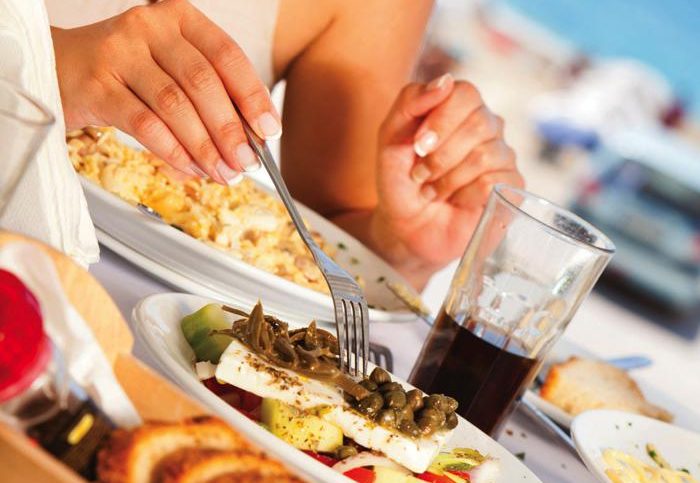For many it’s a grave social fear, this eating alone business. Thankfully I never had to do it much growing up, since I came from a large family. On days when both my parents were working I’d prepare food for my sister and I; perhaps an improvised quesadilla. Or my brother would bring a bag of burgers from somewhere on his mornings off, usually on half-off days throughout the week, or we just might throw together a “helper” of some kind.
In high school we had an open campus, and it wasn’t hard to find a friend who’d agree to walking across the Senior Lot for burgers that could have fed both of us twice, with enough french fries to drown in. On special occasions we’d go to a French-style bakery run by a Lebanese family where I went on my first date. I still remember what I had: a vanilla French soda, an apple cushion, a southwestern chicken sandwich, and a strained attempt at conversation. It was too much to eat and we ended up spending too much (of his) money. Fine by me.
I attended university in the same pulsing college town where I went to high school. Home was just a five-minute drive away, but instead I’d join other students on Campus Corner. Since I had a male-dominant degree program, the lunchtime food choices, accompanied by a bevy of male classmates, were mostly masculine and mostly provincial bar food; burgers, burritos, and sparely-made sandwiches. I only once or twice coaxed a friend to try something new. Either a Greek place for gyros, or out for Pakistani food, which was open only for a semester (that location rotated establishments frequently, at times a frozen yogurt store, a pad thai joint, or an Ashtanga yoga studio). But they never agreed to go more than once.
In the extra time between classes, I’d indulge myself alone at Cafe Plaid, with my laptop and a bowl of tomato basil soup with cheese focaccia and a sugar cookie. I never once tried their coffee, which doesn’t make me a bad American, it just means I like hot chocolate more. I tried their pesto chicken sandwich and their tortellini salad only on occasion. “Same thing today,” I’d tell the server. “That’s good, that just means you know what you like,” he said once. I’d sit in a booth if there was room or at a table by the rain-smeared window, watching the stray huddled professor or the girls in their summer dresses, hoping that a soulful-eyed student might make eye contact with me through the glass.
When I was feeling especially feminine and the girls I knew were busy and I couldn’t convince any of my male classmates to go with me, I’d frequent a shop of overpriced dresses, another of candles and cupcakes, before heading to a Mexican restaurant for a single dark-meat chicken enchilada and a glass of tap water. I didn’t need to eat much in those days. And I was interested in stretching my stipend as long as possible, so the meal cost less than $4. Since I picked up my meal at the counter I didn’t have to tip.
After leaving America for Kuwait, I often felt like a burden on my husband’s coworkers’ wives when I’d drop by on short notice, hungry for company, obliging them to grudgingly place a fried plate of chicken liver before me on a placemat on the floor. Although I declined, they were bound by a tradition of hospitality, which meant my showing up precluded extra food to make and dishes to wash. I took to cruising the streets in search of lunch and a place to stay. Although when I eat with someone else I try new places, I returned to the same burger place, or, on alternate days, the same cafe, perusing the menu only to order a #1 with fries or a side salad and a sparkling water. When I went anywhere else, it was only for a plug for my laptop and a sparkling water or a croissant. Dining alone in Kuwait had its detractors too, when I stayed too long at a coffee shop and the barista asked me if I didn’t like being at home, if that’s why I was there for four consecutive hours with a book and an orange juice.
Being served outside is a separate luxury for a lone diner, but serving yourself when you’re housebound (I am never alone now; my companion is my milk-fed son) feels narcissistic, since creating a meal is an act of love and demands appreciation. Sometimes I wait until I am famished before treating myself to things my husband finds disgusting: celery and cucumber smoothies or eggs scrambled in yogurt made with a certain flourish while singing “The Wheels on the Bus” to my baby, who, fond of the aroma of dried fenugreek leaves, sniffs my spices before I put them in. And when my husband has to go for a business dinner, I skip the salad and eat kebabs from a shop downstairs with falafel rissoles that stain with oil the paper bag they came in. Even though it’s usually making the best of a bad situation, there is a certain private joy in dining alone. I skip the chit-chat, the other’s gastronomic disappointment. I eat what pleases me.








